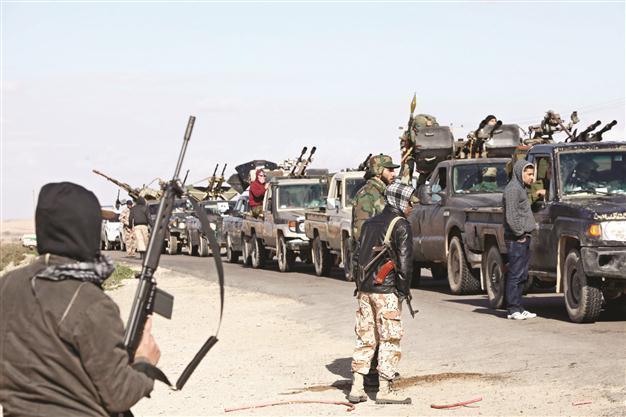Libya splits before seeing unity
BANI WALID / UNITED NATIONS

Libya’s former rebels gather Jan 25 at a checkpoint near a mosque, 60 kilometers from the town of Bani Walid, the former bastion of Gadhafi. The violence between NTC forces and local militias, which began Jan 23 in Bani Walid, left at least five people dead. AFP photo
Libya recognized a tribal-based local government in the former Gadhafi stronghold of Bani Walid on Jan. 25, illustrating the power of tribal leaders over the fragile interim government. On the same day, the U.N. said Libyan militias were out of control and holding thousands of people in secret detention centers, while the weak interim government struggled to assert its authority.Fighters from the Warfallah tribe, the dominant tribe in Bani Walid and the most populous in Libya, drove out a pro-government militia from the town this week. Salah al-Maayuf, a member of the Warfallah Elders Council in Bani Walid, said his tribal body appointed a new local council Jan. 24 and Defense Minister Osama al-Juwali recognized the body during all-day talks Jan. 25.
“The defense minister told us that if we, as a tribe, believe that the new local council in Bani Walid will work, then we have convinced him that it can,” Maayuf told Reuters from Bani Walid, a bastion of support for former leader Moammar Gadhafi during last year’s rebellion. “We told him that we want to keep the whole country peaceful and that national unity was a priority,” Maayuf added. An official at the Defense Ministry confirmed that Juwali had accepted the new council but did not give further details.
Dismissal of NTC
Despite earlier statements, al-Juwali told Agence France-Presse that Bani Walid was under government control as he toured the town.
“The town is in the control of the Libyan government,” al-Juwali said. “The problem that started has been resolved,” he said, referring to the violence Jan. 23 in which at least five people died. “The town is in the control of the Libyan government,” al-Juwali said. “The problem that started has been resolved,” he said, referring to the violence Jan. 23 in which at least five people died.
Echoing complaints by residents that the National Transitional Council (NTC) fighters had been harassing people, making arrests and abusing prisoners, the town’s elders said Jan. 24 they did not want any interference from the Tripoli authorities and dismissed the local NTC council. The unrest will heighten doubts about the NTC’s ability to bring order and establish control over armed groups.
U.N. Human Rights Commissioner Navi Pillay and U.N. Special Representative in Libya Ian Martin expressed concern about the revolutionary brigades that fought Gadhafi’s troops but have not been brought under control by the interim government. Martin said fighting in Bani Walid – at one point blamed on Gadhafi loyalists – had been caused by a clash between local people and a revolutionary brigade unit. He said the brigades were also responsible for fatal clashes in Tripoli and other towns this month.
Weak state institutions
“Although authorities have successfully contained these and other more minor incidents that continue to take place across the country on a regular basis, there is the ever present possibility that similar outbreaks of violence could escalate,” Martin told a U.N. Security Council meeting on Libya. “The former regime may have been toppled, but the harsh reality is that the Libyan people continue to have to live with its deep-rooted legacy,” said Martin. He described the legacy as “weak, at times absent, state institutions, coupled with the long absence of political parties and civil society organizations, which render the country’s transition more difficult.”
Pillay also said she was “extremely concerned” about thousands of detainees held by the brigades, many of them from other African countries who are accused of being Gadhafi loyalists. Pillay said more than 8,000 pro-Gadhafi supporters were being held by militia groups, amid reports of torture.
















